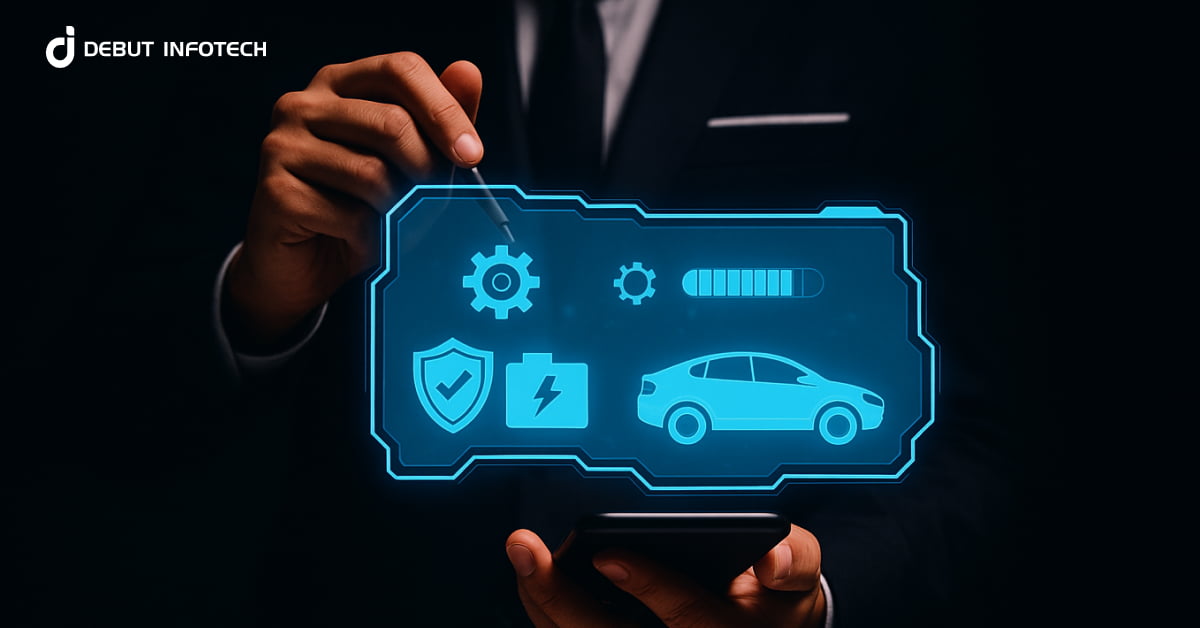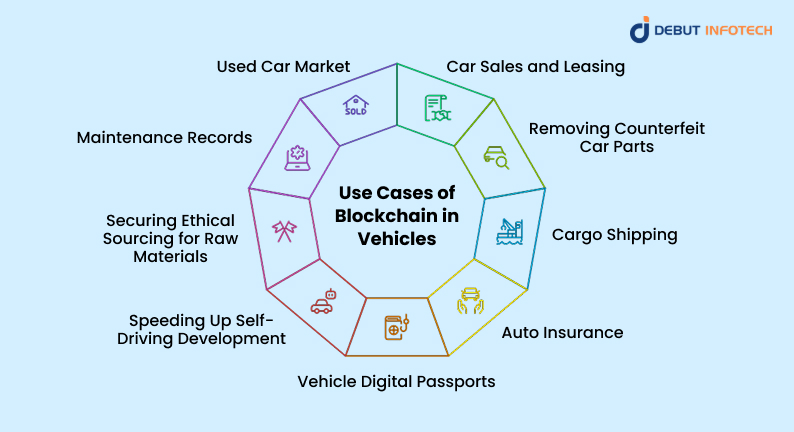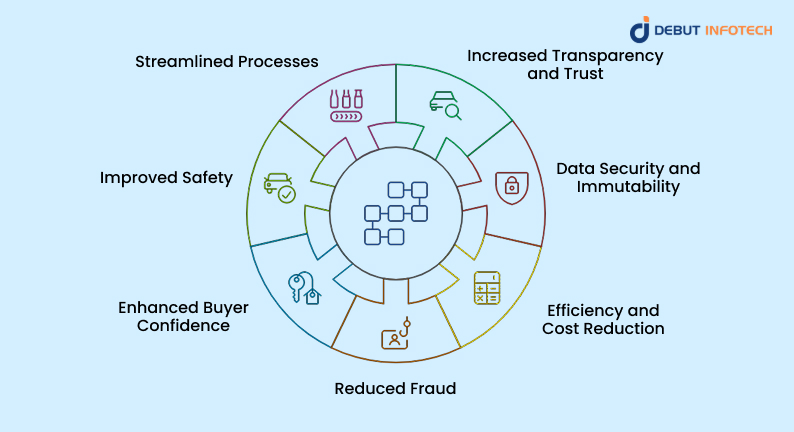Table of Contents
Home / Blog / Blockchain
Blockchain for Vehicle History and Ownership Verification
June 13, 2025

June 13, 2025
Blockchain for vehicle systems transforms how data is stored, verified, and shared across the automotive ecosystem. From enhancing transparency in car sales to combating counterfeit parts, blockchain offers secure and tamper-resistant solutions for various vehicle-related processes.
Notably, the global automotive blockchain market was valued at approximately USD 813.95 million in 2023 and is projected to reach nearly USD 5.46 billion by 2030, rising at a CAGR of 31.25%. In addition, initiatives like the California DMV’s digitization of 42 million car titles using blockchain technology aim to combat fraud and streamline title transfers.
In this article, we will discuss the various use cases, benefits, and challenges of adopting blockchain in the automotive sector. We will also highlight real-world implementations and their growing role in modern vehicle registration systems.
Let’s Build a Blockchain-Based Vehicle History System
We’ve got the team and the experience to make it happen and provide real systems that deliver real results.
Understanding Blockchain in Vehicles
Blockchain technology, initially designed for financial transactions, has found a powerful application in the automotive industry. At its core, blockchain enables decentralized, tamper-resistant recording of data across a distributed ledger. This means every transaction or update—whether about ownership, mileage, or repair history—is securely recorded and permanently accessible to authorized stakeholders. For vehicle manufacturers, fleet operators, insurers, and individual consumers, this translates to greater data integrity, increased operational efficiency, and improved trust throughout the vehicle lifecycle.
Use Cases of Blockchain in Vehicles

Blockchain is reshaping the automotive industry by offering secure, transparent, and decentralized solutions. Here are some of the most promising blockchain use cases in vehicle-related sectors, from manufacturing and logistics to insurance and autonomous driving:
1. Car Sales and Leasing
Blockchain for vehicle simplifies car sales and leasing by offering a single, immutable record of vehicle ownership, service history, and mileage. This reduces administrative delays, eliminates title disputes, and speeds up approval for leasing contracts or auto loans. Buyers and lessors can instantly verify a car’s legal and mechanical status, helping avoid fraudulent listings and easing regulatory compliance across jurisdictions.
2. Removing Counterfeit Car Parts
By embedding unique blockchain IDs on car components, manufacturers and service providers can verify authenticity from production to installation. This traceability ensures only legitimate parts enter repair networks, reducing safety risks and warranty violations. Mechanics and buyers can scan part data to confirm origin and specifications, creating a secure ecosystem that discourages black-market automotive components.
3. Cargo Shipping
Vehicle cargo shipping benefits from blockchain’s ability to provide transparent, real-time tracking across customs, logistics companies, and manufacturers. Smart contracts automate shipment releases and compliance checks, reducing bottlenecks in ports. Since all updates are visible to authorized users, blockchain also helps detect route deviations, shipment damages, or delays promptly—making the entire supply chain more secure and accountable.
4. Auto Insurance
Blockchain transforms auto insurance by giving insurers direct, verified access to a vehicle’s driving behavior, accident history, and service records. Smart contracts can automate claim submissions and payouts once certain conditions are met. Fraudulent claims are easier to detect due to transparent data history. At the same time, personalized policies based on usage and maintenance encourage safer driving habits and fairer premiums.
5. Vehicle Digital Passports
A blockchain-based digital passport stores the complete lifecycle of a vehicle—from assembly and sales to repairs and accidents. This record is accessible by authorized users, making ownership transfers more efficient and reducing misinformation. Buyers, sellers, insurers, and regulators benefit from uniform access to accurate, time-stamped data, improving decision-making, resale value, and regulatory trust in vehicle documentation.
6. Speeding Up Self-Driving Development
Self-driving vehicles require constant data exchange for improvements. Blockchain enables autonomous systems to share and access critical data—such as road conditions, hazard encounters, and vehicle-to-vehicle communication—without risking intellectual property theft. This secure collaboration accelerates AI learning and model training while maintaining brand data ownership and compliance with regional privacy or safety standards in testing environments.
7. Securing Ethical Sourcing for Raw Materials
Blockchain for vehicle helps automakers trace critical raw materials—like lithium and cobalt—from certified mining sites through refiners and component manufacturers. It documents each transaction and movement in a tamper-proof ledger, promoting compliance with ethical sourcing standards. Stakeholders can audit and verify that materials were sourced responsibly, helping companies meet ESG goals and provide transparency to environmentally conscious consumers.
8. Maintenance Records
Blockchain allows service and maintenance records to be logged transparently and immutably. This ensures every oil change, brake replacement, or recall fix is securely documented and easily accessible. Workshops, dealerships, and owners can all contribute to a unified record. This builds trust, especially during resale, and discourages manipulation of service histories, a common issue with conventional paper-based systems.
9. Used Car Market
In the used car market, blockchain brings clarity and credibility. Buyers can instantly verify a vehicle’s service history, ownership chain, mileage, and accident records without relying solely on seller disclosures. This reduces fraud, enhances buyer confidence, and streamlines negotiations. Sellers also benefit by proving vehicle integrity through verified blockchain records, potentially commanding higher resale values and quicker closing times.
Overview of Blockchain in Vehicle History and Ownership Verification
Traditionally, verifying a vehicle’s history and ownership involves disparate databases, physical paperwork, and trust in intermediaries. Blockchain eliminates these pain points by offering a single, secure source of truth. Each event in a vehicle’s life is cryptographically recorded and time-stamped. This continuous and unalterable chain of events helps eliminate discrepancies, ensuring that history reports are both complete and verifiable.
How Blockchain Works in Vehicle History Reporting
When a vehicle is manufactured, its digital profile is created on a blockchain. Every future interaction—registration, service, sale, or accident—is logged by authorized parties and validated by the network. This system prevents unauthorized data alterations and ensures consistency across jurisdictions. Owners, buyers, dealers, and insurers can access real-time, reliable history from a shared platform without needing third-party brokers.
The Advantages of Blockchain for Vehicle History Reports

Using blockchain for vehicle history reports offers several compelling advantages. These benefits improve operational efficiency and help protect buyers, insurers, and regulatory bodies through trustworthy and tamper-proof data records.
1. Increased Transparency and Trust
Blockchain ensures that every recorded detail about a vehicle—whether an accident, service or ownership change—is visible and verifiable. Buyers can trust the data without relying on third-party brokers or unverifiable claims. This transparency reduces conflict, encourages open transactions, and improves confidence among used car dealers, insurance companies, and customers engaging in vehicle purchases or leasing.
2. Data Security and Immutability
Data stored on a blockchain is cryptographically encrypted and cannot be altered without consensus, ensuring tamper resistance. Unlike centralized databases vulnerable to hacking or internal corruption, blockchain creates a secure, decentralized system where every update is logged and validated. This immutability protects vehicle history records from unauthorized changes and builds a reliable source of information across different users.
3. Efficiency and Cost Reduction
By automating data verification and eliminating redundant paperwork, blockchain reduces administrative overhead across the automotive ecosystem. Ownership transfers, insurance verification, and vehicle inspections can be executed faster through smart contracts. These time-saving features cut processing costs for dealers, government agencies, and insurers while also reducing transaction delays for buyers and other end users.
4. Reduced Fraud
Odometer rollbacks, title washing, and counterfeit service reports are significantly harder to execute in a blockchain environment. Every record, from mileage to ownership changes, is timestamped and validated across the network. Since all parties reference the same immutable history, attempts to manipulate vehicle data are easily flagged, helping enforce regulatory compliance and reduce fraud-related losses.
5. Enhanced Buyer Confidence
Access to verifiable data about a vehicle’s past enables consumers to make more knowledgeable purchase decisions. Buyers are reassured when they can view service intervals, accident history, and part replacements on a transparent ledger. This assurance reduces post-sale disputes and encourages long-term loyalty, especially in the used car market, where hidden issues often lower customer satisfaction.
6. Improved Safety
Blockchain’s permanent data record helps track safety recalls, service compliance, and critical part replacements. Repair shops and manufacturers can instantly verify whether updates were performed and whether a vehicle is roadworthy. This not only ensures accountability but also helps prevent the use of non-compliant or faulty vehicles on public roads, contributing to overall traffic safety and accident prevention.
7. Streamlined Processes
Processes like ownership transfers, registration renewals, and service approvals often involve multiple intermediaries and delays. Blockchain for vehicle enables these transactions to be executed automatically and transparently. Smart contracts confirm eligibility criteria in real-time, reducing paperwork, cutting down human error, and allowing all involved parties—dealers, insurers, and government bodies—to act more quickly and efficiently.
Examples of Blockchain-Based Vehicle History Systems
Several innovative platforms are already applying blockchain to real-world vehicle data tracking. These systems are helping transform how we manage, verify, and share vehicle history across borders and stakeholders.
1. EverTrack
Through blockchain integration with real-time telematics, EverTrack provides detailed maintenance, usage, and health data for fleets. It helps companies monitor vehicles proactively, reduce downtime, and validate maintenance schedules. Its blockchain backbone ensures that all logged data is accurate, tamper-proof, and available to stakeholders at any point in the vehicle’s operational life.
2. CarChain
CarChain offers decentralized vehicle identity solutions by linking a car’s VIN to its ownership and service history. It’s designed for global interoperability, allowing manufacturers, governments, and dealerships to share secure, uniform data. Users can verify car history instantly, reducing fraud and supporting compliance across regional and international automotive markets.
3. CrowdCarLink
CrowdCarLink enables vehicle owners to submit verified history data onto a blockchain using secure cryptographic keys. It’s designed to democratize vehicle data control and reduce reliance on central databases. With peer-to-peer authentication, it enhances transparency and encourages collective data integrity while maintaining individual ownership rights over submitted information.
4. CertiShield
CertiShield blends IoT-based diagnostics with blockchain to certify real-time vehicle conditions. Targeted at insurers, regulators, and used car marketplaces, it prevents fraud by ensuring that all reported data—like engine health, accident damage, or service compliance—is accurate and verified. It creates a trusted digital certificate for each vehicle that can be accessed securely.
5. BCvehis
BCvehis offers a blockchain-based platform for securely recording and sharing vehicle data, including ownership, accidents, and mileage. It aims to prevent fraud and boost buyer confidence by ensuring transparency across national and cross-border vehicle transactions.
Challenges in Adopting Blockchain in Vehicle History and Ownership Verification
Despite its potential, blockchain adoption in vehicle systems is not without hurdles. The following are the key challenges that stakeholders must navigate to implement secure and scalable blockchain solutions industry-wide:
1. Huge Technological Investment
Implementing blockchain across national vehicle systems demands significant capital investment. This includes developing secure infrastructure, integrating with legacy databases, and ensuring interoperability between manufacturers, insurers, and government agencies. Small- and medium-sized companies may struggle to justify the blockchain development cost, and public institutions often lack the budget or strategic vision to implement such large-scale digital transformations without major external partnerships or subsidies.
2. Education of Both Consumers and Businesses
Many car buyers, sellers, and service providers still have a limited understanding of blockchain technology. This lack of knowledge leads to skepticism, underutilization, and resistance to adoption. Businesses must invest in training, while public awareness campaigns are needed to foster trust. Without broad-based digital literacy, blockchain’s benefits remain underleveraged in vehicle ownership verification and history tracking, slowing down industry-wide implementation and potential value generation.
3. Low Scalability
Blockchain networks can struggle with scalability, especially when handling the massive volume of transactions involved in global automotive markets. Processing speed, energy use, and network congestion are concerns, particularly with public blockchains. To function at national or international levels, systems must be able to support millions of vehicle entries and updates without latency or compromise in data integrity, which requires significant technical innovation and optimization.
4. Collaboration and Consensus
Effective blockchain deployment requires close collaboration among automakers, regulatory agencies, insurers, and dealers—many of whom are competitors or operate under different standards. Achieving consensus on protocols, data formats, and governance frameworks is difficult. Without uniformity and mutual trust, fragmented blockchain implementations emerge, undermining the goal of a unified, transparent vehicle data system that can serve multiple stakeholders seamlessly across borders.
5. Low Workforce Availability
There is a limited global talent pool with expertise in both blockchain development and automotive data systems. Skilled professionals are in high demand and short supply, making it difficult for organizations to hire blockchain developers or invest in upskilling. This talent gap slows implementation and increases costs, particularly for government agencies or smaller enterprises that cannot compete with large tech firms for blockchain specialists.
Blockchain-Based Vehicle Registration Systems
Blockchain-based vehicle registration systems offer a secure, transparent way to manage vehicle records from purchase to decommission. By storing ownership data, title transfers, inspection records, and tax information on a decentralized ledger, these systems minimize fraud, eliminate paperwork, and reduce processing time for both buyers and government agencies.
Smart contracts can automate renewals and ownership changes once pre-set conditions are met, improving administrative efficiency. Blockchain also allows law enforcement and insurance firms to verify data instantly.
Countries like Sweden and India are already piloting blockchain for digital vehicle registration, setting the foundation for broader adoption in transportation governance. With blockchain development services, governments can streamline registration, enhance transparency, and minimize fraud across vehicle-related operations.
Ready to Build Your Blockchain Vehicle Registry?
If you’re ready to create a secure, tamper-proof system for tracking vehicle ownership and history, we’re prepared to build it with you.
Conclusion
Blockchain for Vehicle applications is revolutionizing the automotive industry by providing secure, transparent, and efficient solutions for history tracking, registration, and more. As blockchain platforms continue to evolve, the benefits of blockchain will become increasingly accessible to manufacturers, regulators, insurers, and consumers.
While challenges persist, the growing adoption of blockchain signals a significant shift in how vehicle data is managed and trusted globally. Embracing blockchain could be vital to building a smarter and more accountable automotive future.
FAQs
Q. What is the blockchain vehicle history?
A. It’s a digital record of everything a vehicle’s been through—accidents, repairs, ownership changes—all stored on blockchain. That means it’s locked in, tamper-proof, and super easy to verify. No shady edits or missing info. It’s like a car’s diary that can’t lie or get lost.
Q. What is blockchain for a trust network among intelligent vehicles?
A. It’s basically a secure way for smart vehicles to talk to each other and share info—like traffic updates or system alerts—without anyone messing with the data. Blockchain keeps things honest, so every car can trust what it’s receiving. There is no middleman, just secure, real-time communication.
Q. How to get a vehicle history report
A. Go online to services like Carfax, AutoCheck, or your local DMV site. Just plug in the VIN (Vehicle Identification Number), pay a fee if needed, and boom—you’ll get a full report on the car’s past. It’s super helpful before buying any used ride.
Q. How to check vehicle history
A. You’ll need the car’s VIN. Then, visit sites like Carfax or AutoCheck. Enter the number and pay if it’s a paid service. The full history pops up—mileage, accidents, service records. It is an easy way to avoid nasty surprises before buying a used vehicle.
Q. What is security approach for in-vehicle networking using blockchain technology?
A. It means using blockchain to protect all the data flying around inside your car—from sensors, GPS, cameras, and more. Every bit of info gets logged securely, so hackers can’t mess with it. It keeps your car’s tech running safely and honestly.
Talk With Our Expert
Our Latest Insights
USA
Debut Infotech Global Services LLC
2102 Linden LN, Palatine, IL 60067
+1-708-515-4004
info@debutinfotech.com
UK
Debut Infotech Pvt Ltd
7 Pound Close, Yarnton, Oxfordshire, OX51QG
+44-770-304-0079
info@debutinfotech.com
Canada
Debut Infotech Pvt Ltd
326 Parkvale Drive, Kitchener, ON N2R1Y7
+1-708-515-4004
info@debutinfotech.com
INDIA
Debut Infotech Pvt Ltd
Sector 101-A, Plot No: I-42, IT City Rd, JLPL Industrial Area, Mohali, PB 140306
9888402396
info@debutinfotech.com



Leave a Comment